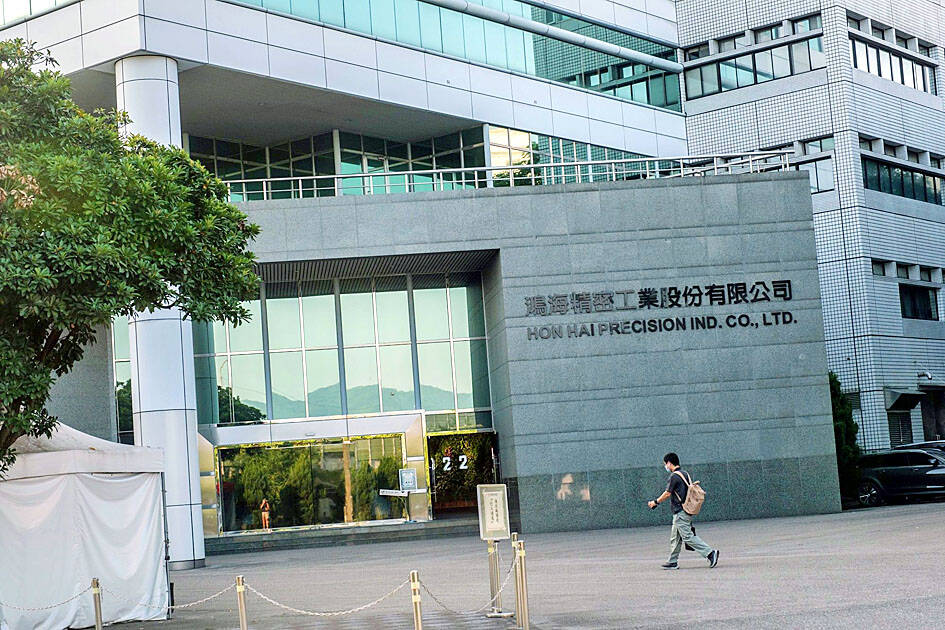Hon Hai Precision Industry Co (鴻海精密) yesterday said that revenue last quarter expanded at a faster-than-expected pace quarter-on-quarter after a spike driven by the launch of Apple Inc’s iPhone 14 series.
The major iPhone assembler said that sales last month surged to NT$822.3 billion (US$25.9 billion), up 83 percent from NT$448.91 billion in August, due to smooth production and strong growth momentum from smartphone demand.
Sales grew 40.39 percent from NT$585.73 billion a year earlier, it said.

Photo: Lam Yik Fei, Bloomberg
“Strong revenue performance in smart consumer electronics products was the main revenue driver,” Hon Hai said in a statement.
In addition, cloud-based and networking products grew by a double-digit percentage last month, thanks to increases in server shipments, the company said, adding that computing products also delivered significant growth.
Third-quarter revenue jumped 15.62 percent quarterly and 24.4 percent annually to NT$1.746 trillion, the best third-quarter revenue in the company’s history, it said.
Last quarter’s performance greatly exceeded Hon Hai’s previous guidance of a flat quarter compared with the second quarter. The company had expected a high base of comparison a quarter earlier and uncertainty about consumer adoption of new iPhones to constrain its revenue growth.
Hon Hai said it is “cautiously positive” about its business performance this quarter given rising inflation, the development of the COVID-19 situation and supply chain issues.
Cumulative revenue for the year through last month totaled NT$4.66 trillion, up 13.66 percent from NT$4.1 trillion a year earlier.
The company kept its revenue growth forecast for this year unchanged.
Hon Hai is the major assembler of the iPhone 14 series, with 60 to 70 percent of orders, TF International Securities Group Co (天風國際證券) analyst Kuo Ming-chi (郭明錤) said.
Hon Hai would “markedly benefit” from an increase in average selling prices of iPhone 14s, Kuo said.
Apple has asked Hon Hai to switch its iPhone 14 production lines to make to iPhone 14 Pro models to meet higher demand, he wrote on Twitter last week.
The average selling price of iPhone 14 phones would rise by about 15 percent compared with iPhone 13 devices to between US$1,000 and US$1,050, as sales of iPhone 14 Pros appear better than expected, he said.
Shipments of iPhone 14 Pros are projected to reach 60 to 65 percent of total iPhone shipments, outperforming last year’s Pro series, which had a shipment share of 50 to 55 percent, Yuanta Securities Investment Consulting Co (元大投顧) said in a note last month, adding that Hon Hai would be a major beneficiary, as it is the exclusive supplier of the iPhone 14 Pro series.

CHIP RACE: Three years of overbroad export controls drove foreign competitors to pursue their own AI chips, and ‘cost US taxpayers billions of dollars,’ Nvidia said China has figured out the US strategy for allowing it to buy Nvidia Corp’s H200s and is rejecting the artificial intelligence (AI) chip in favor of domestically developed semiconductors, White House AI adviser David Sacks said, citing news reports. US President Donald Trump on Monday said that he would allow shipments of Nvidia’s H200 chips to China, part of an administration effort backed by Sacks to challenge Chinese tech champions such as Huawei Technologies Co (華為) by bringing US competition to their home market. On Friday, Sacks signaled that he was uncertain about whether that approach would work. “They’re rejecting our chips,” Sacks

NATIONAL SECURITY: Intel’s testing of ACM tools despite US government control ‘highlights egregious gaps in US technology protection policies,’ a former official said Chipmaker Intel Corp has tested chipmaking tools this year from a toolmaker with deep roots in China and two overseas units that were targeted by US sanctions, according to two sources with direct knowledge of the matter. Intel, which fended off calls for its CEO’s resignation from US President Donald Trump in August over his alleged ties to China, got the tools from ACM Research Inc, a Fremont, California-based producer of chipmaking equipment. Two of ACM’s units, based in Shanghai and South Korea, were among a number of firms barred last year from receiving US technology over claims they have

It is challenging to build infrastructure in much of Europe. Constrained budgets and polarized politics tend to undermine long-term projects, forcing officials to react to emergencies rather than plan for the future. Not in Austria. Today, the country is to officially open its Koralmbahn tunnel, the 5.9 billion euro (US$6.9 billion) centerpiece of a groundbreaking new railway that will eventually run from Poland’s Baltic coast to the Adriatic Sea, transforming travel within Austria and positioning the Alpine nation at the forefront of logistics in Europe. “It is Austria’s biggest socio-economic experiment in over a century,” said Eric Kirschner, an economist at Graz-based Joanneum

France is developing domestic production of electric vehicle (EV) batteries with an eye on industrial independence, but Asian experts are proving key in launching operations. In the Verkor factory outside the northern city of Dunkirk, which was inaugurated on Thursday, foreign specialists, notably from South Korea and Malaysia, are training the local staff. Verkor is the third battery gigafactory to open in northern France in a region that has become known as “Battery Valley.” At the Automotive Energy Supply Corp (AESC) factory near the city of Douai, where production has been under way for several months, Chinese engineers and technicians supervise French recruits. “They